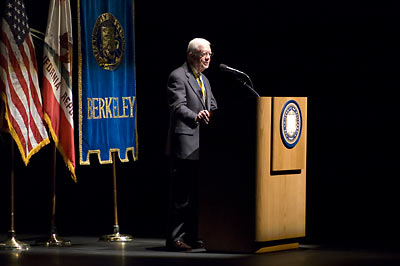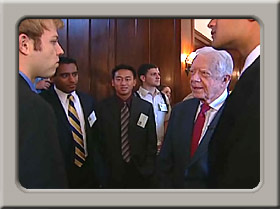UC Berkeley Web Feature
 |
Former President Jimmy Carter delivers a talk on the history and potential future of Middle East peace efforts at Zellerbach Hall. (Steve McConnell/ NewsCenter photos) |
For 90 minutes this week, Berkeley was Carter Center West
Before a packed Zellerbach audience, the former president urged the U.S. to reassume its role as 'honest broker' in the Middle East, citing strong support among Israelis for a deal that would trade territory for a lasting peace
BERKELEY – It hasn't been the kind of book tour that Oprah would recognize, but in a series of speaking engagements on selected college campuses this year, former President Jimmy Carter has presented, in scaled-down form, the case for Palestinian statehood made at length in his controversial book, Palestine Peace Not Apartheid.
| More coverage |
 Meet the students: Before his speech, President Carter chats with students at a reception and book signing. Watch the video |
He brought that message to Berkeley on Wednesday afternoon before a packed and respectful Zellerbach Hall audience, composed primarily of students, as was the wish of the two enterprising seniors whose invitation to Carter brought him here.
At the outset of his remarks, Carter said he had visited Brandeis, Emory, Iowa, George Washington, and Georgia State this year, but noted that Berkeley was "the most important of all," to which the largely student audience responded with blue-and-gold-enthusiasm.
Students Aidan Ali-Sullivan and Ali Ansary '07, the letter-writers who issued the Berkeley invitation, each spoke briefly before Carter took the stage. They received a thunderous reception from students in the hall, leading Carter later to characterize them as "rock stars."
The pair helped Chancellor Birgeneau present Carter with the Berkeley Medal — since 1981 the campus's highest honor to distinguished visitors.
Cater devoted the first portion of his talk to establishing his bona fides as a friend of Israel and a first-hand witness to a crucial period in its relations with its Arab neighbors. Using his administration's efforts on behalf of Mideast peace between 1977 and 1980 as a framework, he recapped the efforts, on all sides, that led to the historic 1978 Camp David accords, a peace agreement between Israel and Egypt that has remained in effect ever since, and that won Carter a Nobel Peace Prize in 2002.
"I did all I could," Carter said, "and left office [in 1981] believing that Israel would soon realize a dream of peace with its neighbors. [It is] a small nation that exemplifies the finest moral ideals, based on the Hebrew scriptures that I have taught on Sundays since I was 18 years old, where justice is mentioned 28 times in what we call the Old Testament, and righteousness is mentioned 196 times."
Without criticizing his four successors by name during his prepared remarks, Carter noted that the Camp David accords mark the last successful involvement by the United States in peace negotiations involving Israel and any Arab state.
"History has shown," he said, "that progress in the Middle East is possible only if the United States assumes its role as honest broker." He lamented the number of years that have passed since the two sides engaged in negotiations, even limited ones, referring to today's "non-existent peace process." Asked after his formal remarks what hope he has for peace in the Middle East under the Bush administration, he responded instantly, "Practically none."
At the same time, Carter said that "the long-term prospects for peace are not discouraging." He said popular opinion in both Palestine and Israel strongly supports the notion of a return to Israel's internationally recognized borders in exchange for permanent security. And he noted the recent call by U.S. Secretary of State Condoleezza Rice for early U.S./Israeli/Palestinan talks, and her recommendation that the offer of full recognition of Israel based on a return to its internationally recognized borders — recently repeated, he said, by all 23 Arab nations — serve as the foundation of a future peace.
"I might say," he added, "that this particular offer by all the Arab countries is completely compatible with official U.S. policy, with key United Nations resolutions supported by the U.S. and Israel when they passed, previous agreements approved by the Israeli parliament and government in 1978 and 1993, and also the more recent roadmap for peace developed by the United States, Russia, the U.N., and the European Union."
Undeniable impact
Despite this muted expression of optimism, there was no mistaking the level of Carter's frustration with the state of affairs in Israel and Palestine — a frustration that focuses, in his book and his public appearances and statements, on the lamentable circumstances under which the people of Palestine, the West Bank, and Gaza now live.
The strong stand taken by the former president and Nobel laureate has had an undeniable public impact. Several thousand Berkeley students, unborn during his administration, stood in line last week for tickets to Carter's talk, and on Wednesday stood in another long line — weaving toward Eshleman Hall from its end point somewhere on the student union steps in Sproul Plaza, for a chance to have Carter sign a copy of his book.
His positions also led others to stand in lower Sproul Plaza for an hour prior to his talk, demonstrating either concurrence with or strong objection to Carter's views, particularly his use of the word "apartheid" in the title of his book.
On the plaza's north end, a group students joined with Berkeley Hillel to criticize Carter's appearance, saying in a prepared statement that "his presence will add no light but will bring an unneeded amount of heat." Gordon Gladstone, Berkeley Hillel's acting executive director, said that the word 'apartheid' is "so fraught with emotional baggage that it becomes impossible to have a rational conversation once that term is thrown at you."
No second-guessing
Inside Zellerbach, however, Carter showed no inclination to second-guess himself on that word choice. He stood by his assertion that Israel has instituted a policy of apartheid, which, he said, is defined as "two peoples living in the same land, forcibly segregated one from another, with one of the people completely dominating and persecuting the other." There is no chance for peace in the Middle East, he said, until that condition is changed and Israel acknowledges the legitimacy of Palestinian statehood.
"The bottom line," Carter said, "is this: Israel will never find peace until it is willing to withdraw from its neighbors' land and permit the Palestinians to exercise their basic human and political rights."
The United States should return to its role as an honest broker in the region, he said, not only to show once again its leadership in helping settle the ongoing struggle, but to re-establish its own credibility as a positive force in global affairs. To do that, he said, "We must enjoy a degree of trust and respect from both sides."
Popular opinion in Israel itself will be no bar to any settlement, Carter said. "The premise of obtaining peace in exchange for Palestinian territory adequate for a viable and contiguous state has been acceptable for decades to a substantial majority of Israelis," he said. But it is not acceptable, he continued, "to a minority of the leaders of Israel who have intruded into Palestine," nor to their supporters in "the vocal American Jewish community."
To play an effective role in brokering peace, the United States can't be perceived as being "in the pocket" of one side or another, Carter said. The perception that the United States leans toward Israel is hard to alter, he said, because of the lack of unbiased U.S. media coverage around these issues. He stated flatly that he is not one who believes that Jews control the major media in America, but made equally clear his conviction that the pressure from pro-Israel voices — he singled out in particular the influential American Israel Public Affairs Committee (AIPAC) — has worked in keeping "countervailing voices in the public arena" silent.
"The American friends of Israel who demand such subservience to the government policy in Jerusalem, while in many cases sincere and well-intentioned people … are tragically mistaken on this essential issue. Their demands subvert America's ability to help bring Israelis what they most desperately need and want: peace and security within recognized borders," Carter said.
Unhesitant answers
During a question-and-answer session with Orville Schell, dean of the Graduate School of Journalism, Carter responded to several questions submitted by audience members. Asked if he could entreat Al Gore to run for president in 2008, he said no — adding that he had already implored Gore to do so three times this year. To another question, he said that the bombing of Iran — whether by the United States directly, or by Israel as its proxy — would be "a catastrophe, even worse than what's been happening in Iraq."
Asked what students and others can do to help him in his efforts to shed light on the Palestinians' trials, he had an equally firm answer. As candidates for the presidential nomination pass through California in the months to come, he said, audiences should compel them to make this straightforward pledge: "If elected, I will do everything possible to promote balanced negotiations to achieve peace and security for Israel and a secure and contiguous state for Palestine.
"If they won't make you that pledge," Carter said firmly, "don't support them."


